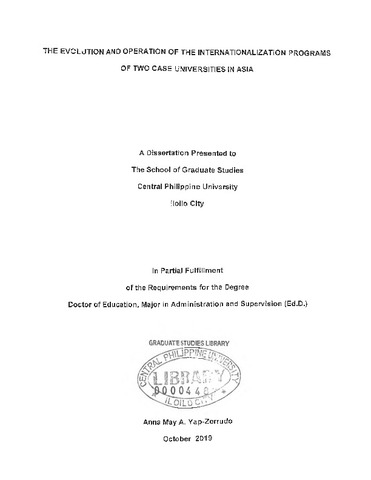Показать сокращенную информацию
The evolution and operation of the internationalization programs of two case universities in Asia
| dc.contributor.adviser | Handa, Vicente C. | |
| dc.contributor.author | Yap-Zerrudo, Anna May | |
| dc.date.accessioned | 2022-11-11T00:24:37Z | |
| dc.date.available | 2022-11-11T00:24:37Z | |
| dc.date.issued | 2019 | |
| dc.identifier.citation | Yap-Zerrudo, A. M. A. (2019). The evolution and operation of the internationalization programs of two case universities in Asia (Unpublished Doctoral dissertation). Central Philippine University, Jaro, Iloilo City. | en_US |
| dc.identifier.uri | https://hdl.handle.net/20.500.12852/2375 | |
| dc.description | Abstract only | en_US |
| dc.description.abstract | This qualitative case study aimed to examine and understand the evolution and operation of internationalization programs of two case universities in Asia. Using the multiple case study design with multiple units of analysis, results of the study were drawn from interviews, documents, and internet resources. For the case university in the Philippines (UHP), internationalization was used as a platform in forging partnerships with foreign universities although differences in cultural orientation and religious beliefs were present. Internationalization resulted in more opportunities for UHP’s academic growth. Cultural evolution explained the cultural aspect in the operation of internationalization of UHP. Assumptions surrounding symbolic interactionism revealed that the Christian orientation and strong alumni relations were the unique symbols of UHP. For the case university in Taiwan (UST), the societal development in the country due to low birth rate resulted in enrolment decline, thus it became UST’s reason for pursuing internationalization. Also, UST’s internationalization is dictated by political factors due to the political tension between Taiwan and mainland China. From the results of the study, a Hybrid Model of the Dynamic Requisites for Internationalization was developed showing the three main requisites that must be present in order for internationalization to be successful. These requisites are governmental, institutional and partnership that will result to tangible and intangible outcomes of internationalization. | en_US |
| dc.format.extent | v, 244 leaves | en_US |
| dc.language.iso | en | en_US |
| dc.subject.ddc | GSL Theses 378.242 Y19 | en_US |
| dc.subject.lcsh | Universities and colleges--International cooperation | en_US |
| dc.subject.lcsh | Globalization | en_US |
| dc.subject.lcsh | Case studies | en_US |
| dc.subject.lcsh | Universities and colleges--International cooperation--Case studies | en_US |
| dc.title | The evolution and operation of the internationalization programs of two case universities in Asia | en_US |
| dc.type | Dissertation | en_US |
| dcterms.accessRights | Not publicly accessible | en_US |
| dc.description.bibliographicalreferences | Includes bibliographical references | en_US |
| dc.contributor.chair | Junsay, Merle | |
| dc.contributor.committeemember | Rio, Irving Domingo | |
| dc.contributor.committeemember | David, Fely P. | |
| dc.contributor.committeemember | Alcudia, Fina Felisa L. | |
| dc.contributor.department | School of Graduate Studies | en_US |
| dc.description.degree | Doctor of Education major in Administration and Supervision | en_US |


